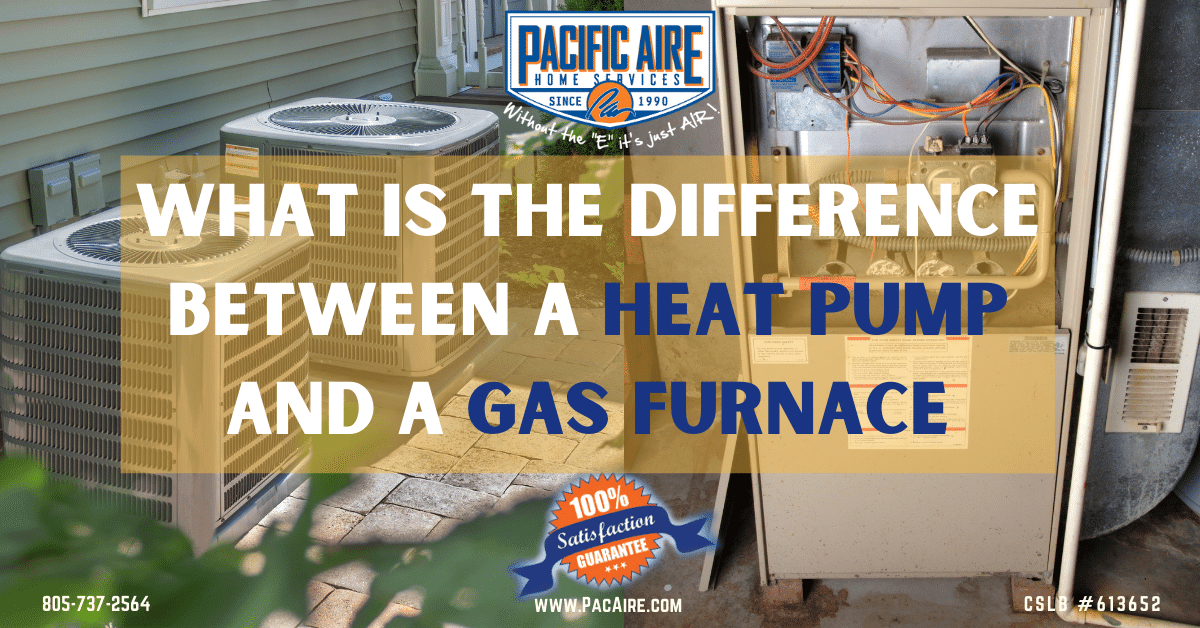California homeowners have many options for heating their homes. Heat pumps and furnaces are two of the main types of central home heating systems. Choosing the right one for your home can be confusing if you don’t know how they differ.
To help you choose, we’ll go over the pros and cons of both heat pumps and furnaces in this blog. To make your decision as informed as possible, we outline the basics, along with the advantages and disadvantages of each option.
Heat Pumps
Heat pumps are unique devices that are becoming increasingly popular. You can use them both for cooling and for heating. Unlike furnaces that create heat, heat pumps move it from one place to another. During the summer season, heat pumps transfer heat from inside your house to the outside, which operates similarly to a central air conditioner. A reverse process occurs in the winter season, as a reversing valve switches the refrigerant direction the heat is transferred from the outside to the inside of your home. The heat pump also uses a blower fan and ductwork system to deliver conditioned air to rooms.
Heat Pump Options
- Heat pump water heaters
- Traditional air-source heat pump
- Ductless mini-split heat pump
- Hybrid heat pump (with backup furnace)
The majority of heat pumps are electric. As with a refrigerator, they work by absorbing heat externally or from the earth, water, or both and conveying it indoors where it is heated. Ductless mini split heat pumps use air handlers instead of ducts to distribute heat.
Heat pumps that use gas do exist, though they are rare. This type of pump is powered by natural gas, but uses ammonia or water as refrigerants instead of gases.
Heat pumps have the following advantages:
- Work efficiently throughout the entire year.
- Reduces your heating and cooling bills.
- You also get an efficient air conditioner.
- Similarly, electric heat pumps give off no combustion gases, while natural gas-powered heat pumps produce few emissions.
- A more environmentally friendly option. A heat pump can produce up to three times as much heat energy as it consumes.
- In general, heat pumps are more efficient than furnaces, especially in warm climates where they provide effective heating.
- Heat pumps that use air for heat conversion are efficient, and they are safe to operate. Unlike furnaces, they can be used for heating and cooling.
- Maintenance is less frequent.
- Keeps homeowners safer and healthier.
- Longer lifespan.
- A variety of incentive programs are available.
- The cost of installing a heat pump can be lower than that of an electric resistance heater or a fuel-based heater. To understand a heat pump retrofit’s cost and benefit, speak with a qualified technician.
Heat pumps have the following disadvantages:
- Prices tend to be higher than furnaces.
- An additional heat source may be needed. Some nights in California may be extremely cold, so backup heat such as a furnace may be necessary.
- The heat pumps do have difficulty maintaining comfortable temperatures when temperatures dip below freezing.
- Although electricity is more expensive, heat pumps are more efficient than natural gas.
Gas Furnaces
In most cases, furnaces are combustion-fueled heating systems that run on gas or oil, but they can also be operated with electricity. Heat exchangers and burners are used in gas and oil-fueled furnaces to create heat, after which the air is blown through ductwork.
In California, gas furnaces are the most common type of heating. Natural gas is burned in furnaces to create heat. The heat is transferred to the air and spread through your home.
Gas furnaces have the following advantages:
- Costs less than heat pumps. In order to achieve the same savings year-round, you must upgrade your air conditioner separately.
- They are energy-efficient. The AFUE rating, which specifies how well they convert gas into heat, can be increased to 97% for gas furnaces.
- It works even in cold weather – no backup heat source is required.
- With this system, the house is heated quickly and evenly.
- Natural gas is relatively cheap, and most homes are equipped with gas lines, vents, and flues.
Gas furnaces have the following disadvantages:
- It is not as energy-efficient as heat pumps. You can still save money, however, with a new furnace since gas is less expensive than electricity.
- More expensive to install than gas- or electric-powered heat pumps, particularly if ductwork must be added. Although the cost and installation of geothermal heat pumps are both relatively high.
- The efficiency of natural gas furnaces does not compare to heat pumps, and there are higher fire and CO poisoning risks with natural gas furnaces. A well-maintained furnace is perfectly safe, and a smoke detector and carbon monoxide detector provide further protection to you and your family.
What is the best option for you?
Heat pumps and furnaces have pros and cons that must be weighed against each other to determine which is best for your home.
You need to decide what is most important to you. A heat pump is an excellent choice if energy efficiency and being environmentally friendly are your top priorities. However, if you just purchased a new air conditioner, it may not make sense to spend the extra money on a heat pump.


